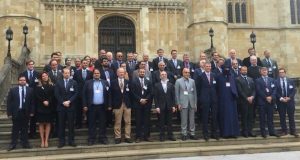By Libya Herald reporters.

London, 12 October 2017:
The National Oil Corporation (NOC) has proposed how it and its oil and gas monopoly should be protected during Libya’s current political transition ahead of a election of a new government and parliament.
In what is clearly a further step by NOC boss Mustafa Sanalla to keep the state oil company properly funded and out of the political firing line, “Protecting Libya’s Oil” was a two-day conference near London which set out eight guiding principles.
Among them was that the current movement of NOC revenues to the Central Bank of Libya (CBL) should be transparent and made public. By the same token, NOC and its subsidiaries should be adequately and transparently funded by the government in a timely manner to guarantee the highest levels of production and exports. Sanalla has repeatedly criticised the Presidency Council (PC) and its head Faiez Serraj for failing to hand over money NOC said it needed for repairs and new investments.
NOC should also continue to enjoy a monopoly of oil and gas production and all new deals with foreign partners had to be transparent. The principles repeated Sanalla’s insistence that any blockade or interference with oil and gas production should be treated as a crime. There should be no concessions nor payments made to anyone who disrupted NOC’s output.
The proposals further sought to protect NOC’s top management from political place-men and ensure the company had a technocratic leadership.
The draft “Statement of Principles” is being sent to UNSMIL chief Ghassan Salamé to lay before the planned National Conference.
The document emerged from a little-heralded high-level meeting at the exclusive St George’s House conference centre inside Windsor Castle. NOC said that those attending included CBL governor Saddek Elkaber, tribal and municipal representatives, the United Nations, the International Monetary Fund, major international oil companies and diplomats from the UK, US, Russia, Italy, Spain and the EU.
Sanalla closed the meeting saying the gathering had been unique. He was grateful for the “open and frank discussions on how Libya can overcome persistent security and governance problems in its oil sector.
“We will work together as Libyan technocratic institutions to put into action each one of these principles and to ensure the whole country realises the benefits”.







